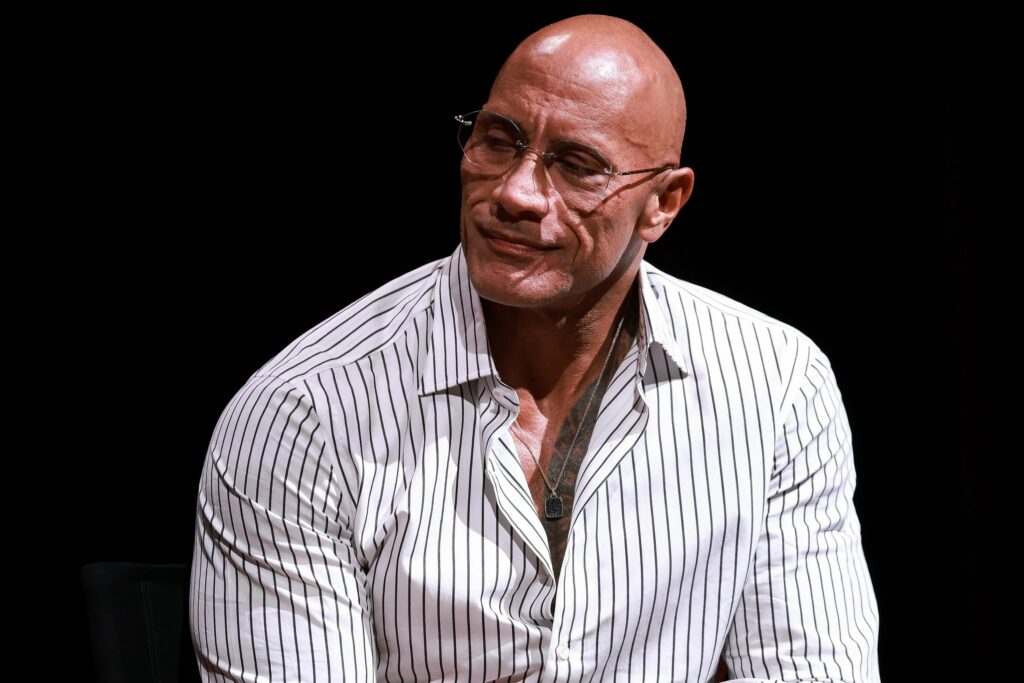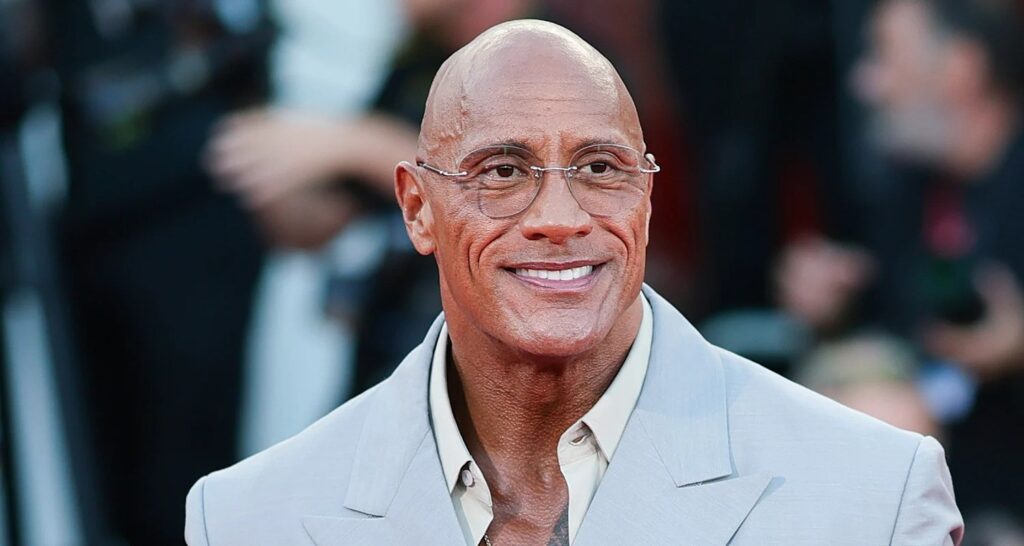Dwayne “The Rock” Johnson has built an entire legacy on being larger than life. From his early wrestling days electrifying arenas to his Hollywood reign as one of the industry’s most bankable stars, Johnson has long been the definition of success, strength, and resilience. But when his latest film, The Smashing Machine, opened to disappointing box office numbers, the superstar took a noticeably different approach — one marked not by bravado, but by humility, gratitude, and deep reflection.
The film, released nationwide on October 3, tells the story of Mark Kerr, a real-life mixed martial arts champion who rose to fame in the late 1990s only to battle devastating addiction and personal demons at the height of his career. For Johnson, portraying Kerr was more than just another role — it was an opportunity to push himself beyond his comfort zone and embrace a side of acting he’d never fully explored before. Instead of playing the invincible hero or the charismatic powerhouse audiences have come to expect, he dove into a character riddled with vulnerability, pain, and internal conflict.
But when the numbers came in, the results were sobering. According to Comscore, The Smashing Machine brought in just $6 million in its opening weekend, marking the lowest debut of Johnson’s entire film career. The movie’s R rating, coupled with its heavy subject matter and modest marketing, may have limited its appeal among his usual broad audience. Industry insiders at Deadline and Variety reported that the movie could end up losing between $10 million and $15 million, given its estimated $35 million production budget. For a star known for billion-dollar franchises like Fast & Furious and Jumanji, it was a humbling result.
Still, Johnson didn’t shy away from addressing the situation. Instead of ignoring the reports or putting a PR spin on them, he took to Instagram on Monday, October 6, to speak directly to his fans. “From deep in my grateful bones, thank you to everyone who has watched The Smashing Machine,” he wrote. “In our storytelling world, you can’t control box office results — but what I realized you can control is your performance, and your commitment to completely disappear and go elsewhere. And I will always run to that opportunity.”
The post struck a chord across social media. For many, it revealed a side of Johnson rarely seen — introspective, grounded, and deeply personal. Gone was the trademark bravado; instead, there was a man genuinely proud of his artistic growth and at peace with the outcome, no matter how commercially underwhelming. “Truth is, this film has changed my life,” he continued. “With deep gratitude, respect and radical empathy.”
Johnson also made sure to highlight the people who helped bring the project to life, thanking filmmaker Benny Safdie for believing he was right for the part. Safdie, one half of the directing duo behind Uncut Gems, has earned a reputation for gritty, emotionally charged storytelling, and The Smashing Machine fits squarely into that lineage. Johnson called it “an honor” to work under Safdie’s direction, emphasizing how transformative the experience had been both professionally and personally.
The movie, which also stars Emily Blunt as Kerr’s wife, Dawn Staples, follows the emotional highs and lows of a man fighting for redemption inside and outside the ring. Critics have noted how the film pushes Johnson to dig deep — portraying the brutal physicality of the sport while balancing the mental and emotional toll of addiction. Blunt has praised her co-star in interviews, describing him as “completely unrecognizable” in the role. “He showed up to set with a level of dedication I’ve rarely seen,” she said. “He wanted to strip away every trace of The Rock and just be Dwayne, just be human.”
Despite the small turnout in theaters, The Smashing Machine managed to secure the No. 3 spot at the box office. It trailed behind Leonardo DiCaprio’s One Battle After Another, which brought in $11 million in its second weekend, and Taylor Swift’s latest cinematic venture, The Official Release Party of a Showgirl, which dominated the top spot with an astonishing $33 million weekend gross. Swift’s film, tied to her newly released album The Life of a Showgirl, became a cultural event — an extension of her ongoing reign as music’s most unstoppable force. According to Deadline, the accomplishment made Swift the only artist in history to simultaneously hold both the No. 1 album and the No. 1 movie in the same weekend, a record even Prince didn’t achieve with Purple Rain in 1984.
Against such fierce competition, it’s perhaps no surprise that Johnson’s smaller, character-driven film struggled to make a splash. Yet the reaction from audiences who did see it has been overwhelmingly positive. Many have praised it as Johnson’s most vulnerable and moving performance to date. Some critics have even gone as far as to say it could mark the beginning of a new chapter in his acting career — one that emphasizes depth over spectacle.
Online discussions surrounding The Smashing Machine have drawn comparisons to other transformative performances by action stars who successfully crossed over into more dramatic territory. Commenters have likened Johnson’s turn as Kerr to Mickey Rourke’s The Wrestler or Matthew McConaughey’s Dallas Buyers Club — both films that saw their stars shed typecasting and earn critical acclaim in the process. “This is Dwayne Johnson like we’ve never seen him,” one viewer wrote. “He’s not saving the world or cracking jokes — he’s broken, raw, human. And it’s powerful.”

That humanity seems to be what Johnson himself values most about the project. In recent interviews, he’s talked about wanting to challenge himself creatively and explore more complex characters that reflect real human struggles. “I love the big movies,” he said in one promotional clip, “but there’s something incredibly fulfilling about telling a story that’s grounded, messy, and honest. The Smashing Machine reminded me of why I fell in love with storytelling in the first place.”
To prepare for the role, Johnson immersed himself in the world of MMA, training alongside real fighters to capture Kerr’s physicality and mindset. He also met with addiction specialists and spent time with Mark Kerr himself, who served as a consultant on the film. “Mark was so open about his journey,” Johnson explained. “He let me see the pain, the triumph, the relapse, the love. It was important to me to honor that truth.”
Those who worked with Johnson on set say his commitment was palpable. Director Benny Safdie reportedly described his lead actor as “fearless,” while Emily Blunt called him “emotionally courageous.” Johnson even changed his physical appearance for the role, losing muscle mass and adopting a leaner, more lived-in look to better embody Kerr’s worn-down physique. The transformation wasn’t just physical, though — it was emotional. Safdie encouraged Johnson to let go of control and embrace discomfort, something Johnson admitted was both terrifying and liberating.
The timing of The Smashing Machine’s release may have worked against it. With Taylor Swift’s surprise film release dominating pop culture conversations and DiCaprio’s film still drawing strong numbers, there was little breathing room for Johnson’s quieter, more introspective project. Still, Johnson seems less concerned with financial returns and more focused on the film’s long-term impact. “You can’t control the box office,” he said, echoing his Instagram post. “But you can control your work ethic, your integrity, and your love for the craft. And that’s what this journey has reminded me of.”
Fans responded to his message with an outpouring of support. Comments flooded his Instagram post, calling him “inspiring” and “courageous.” One fan wrote, “You’ve given us so many heroes over the years — but this is the first time you showed us the man behind the hero.” Another added, “Box office numbers fade. But a performance like this? That stays with people.”
Even Hollywood insiders chimed in. Benny Safdie himself commented on the post, thanking Johnson for “giving everything” to the role. “What you did here will last,” the director wrote. “People are going to remember this performance long after the weekend numbers are forgotten.”
It’s a sentiment that echoes across the entertainment industry — that art, at its best, transcends immediate success. And for Johnson, The Smashing Machine represents exactly that. It’s not about box office records or franchise potential; it’s about the courage to be seen differently. In a landscape obsessed with instant gratification and opening-weekend totals, Johnson’s response serves as a reminder that true artistry often takes time to be recognized.
Meanwhile, Taylor Swift’s dominance continues to set the standard for modern celebrity achievement. Her film The Official Release Party of a Showgirl became an event unto itself, drawing massive crowds to theaters for its limited weekend run. Fans treated screenings like communal celebrations, singing along to songs and sharing videos on social media, turning what could have been a small companion project into a global phenomenon. The $33 million opening further solidified her as a cross-medium powerhouse — one who can effortlessly bridge the worlds of music, film, and fandom.
For Johnson, sharing the weekend spotlight with Swift — an artist whose creative control and authenticity have redefined success in entertainment — feels oddly fitting. Both represent different sides of ambition and self-reinvention. Swift’s victory is dazzling, outward, and collective; Johnson’s is quiet, internal, and deeply personal. Yet both tell stories of resilience, commitment, and passion for craft.
As the days pass, The Smashing Machine may find new life through word-of-mouth and digital platforms. Many emotionally driven dramas with modest openings have gone on to become critical favorites or award contenders, gaining appreciation long after their theatrical runs. Given the depth of Johnson’s performance and Safdie’s track record for unconventional storytelling, it wouldn’t be surprising if the film finds a second wind.
For Johnson himself, the project marks a profound shift. After years of being the box office guarantee, he’s now stepping into territory that values vulnerability over invincibility. His Instagram post — stripped of bravado and filled with heartfelt gratitude — mirrors that evolution perfectly. He’s no longer the unshakable rock towering above everything else; he’s a man learning to embrace uncertainty, to find strength in humility, and to measure success not in millions, but in meaning.

“Some stories aren’t made to break records,” Johnson wrote in his closing line, “they’re made to break hearts, to heal souls, to remind us what being human really means. And for that reason, I’d do it all again.”
Those words, simple yet powerful, capture exactly why The Smashing Machine might endure long after its box office numbers fade into memory. Because at its core, it’s a story — and a performance — about falling down, fighting back, and finding grace in the struggle.
And for an actor who has built his empire on strength, perhaps the greatest act of all is finally showing the world that even The Rock can crack open and let the light in.
